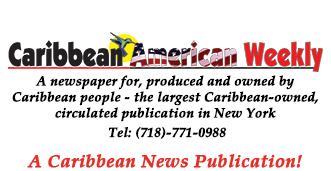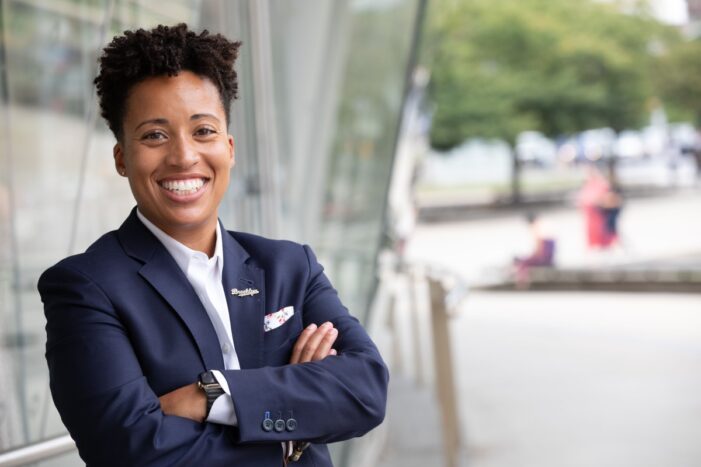Photo Credit: Katrina Hajagos
Brooklyn, NY — Council Member Crystal Hudson will introduce legislation central to her ‘Black Agenda For New York City’ policy platform at June 2 City Council Stated Meeting.
The four bills seek to address issues of racial, economic, and education justice in New York City: Black maternal mortality, universal child care, and persistent discrimination against tenants. The bills would increase access to doulas and midwives, convene a task force to chart a path to achieve universal child care in New York City, prohibit discrimination against rent-regulated and rent-subsidized tenants, and declare June as Caribbean Heritage Month.
In ‘A Black Agenda for New York City,’ Council Member Hudson outlined issue areas and policy priorities aimed at tangibly improving the socio-economic and material well being of Black New Yorkers, including six bold recommendations like a universal basic income for residents of the ZIP codes with the highest rates of gun violence and putting money directly in the hands of poor Black New Yorkers via baby bonds and a paycheck guarantee.
Listen to an interview with Council Member Crystal Hudson below:
Her agenda included a call for a citywide doula program so that all people giving birth can access a doula or midwife regardless of their ability to pay, the creation of a universal childcare system in New York City, housing support for Black residents, and support for Black artists and cultural organizations. These four bills move our City closer to realizing the just and equitable future we all deserve.
“This Council is faced with the opportunity to enact meaningful policies that will deliver true, tangible change for everyday New Yorkers and improve the material conditions of the most vulnerable among us,” said Council Member Crystal Hudson. “My ‘Black Agenda for New York City’ is a roadmap for this legislative body to deliver immediate and equitable solutions to some of the most pressing issues facing our City, from housing and education to childcare and public safety. The policy recommendations put forth in the ‘Black Agenda,’ some of which we will begin to pursue with these introductions are critical to making our City a more compassionate place for all. When we are deliberate in offering care to our most marginalized–many of whom are our Black neighbors–we ensure our entire City thrives.”
Doula Access Bill
This bill, co-prime sponsored by Council Member Jennifer Gutiérrez, would require the Department of Health and Mental Hygiene to conduct an education and outreach campaign about services offered by doulas and midwives to ensure all New Yorkers know of free and low-cost resources. The bill requires the agency to disseminate written materials and publish a report that outlines the methods of outreach used to comply with the law, which would take effect 120 days after becoming law.
“Having recently experienced childbirth, I feel strongly about the benefits that doulas and midwives offer to improve the birthing process,” said Council Member Jennifer Gutiérrez. “Not only can they provide emotional, physical, and educational support, but they also provide another advocate in the room who can ensure a positive and safe birth. Additionally, well-trained doulas are positioned to advocate for women of color in ways that have been shown to help reduce contributing factors of maternal mortality. I’m proud to be introducing legislation with Council Member Hudson to increase awareness of doulas and midwives, promote the benefits they offer to birthing people, and create opportunities for those giving birth to make decisions about their own body and baby, which could save lives.”
Universal Child Care Task Force
This bill, co-prime sponsored by Council Member Julie Menin, will create a specific task force with the sole responsibility of investigating mechanisms to make child care more affordable and accessible to all. It would also review how the City could provide additional funding and resources to providers and child care professionals to support their work.
No later than 270 days after the law goes into effect, the task force would be required to submit a report, put forth recommendations for establishing universal child care for all children ages five and under, and publish it on the Department of Health and Mental Hygiene website. The law would take place immediately upon passage.
“New York City is facing an affordable childcare crisis of astronomical proportions. As we envision the future of our City, we must strengthen the support systems needed to meet the demand for high quality, affordable and equitable childcare,” said Council Member Julie Menin. “Providers around the City severely lack resources and cannot adequately pay and retain qualified staff. This crisis has a ripple effect on many aspects of our daily life. Studies have shown that children who are well cared for have greater success later in life and parents who can afford childcare are more productive members of society. Affordable childcare is the foundation upon which we rebuild from the aftermath of the pandemic. One of the wealthiest cities in the world must take steps to address the need for affordable, high-quality early childhood care.”
Rent Regulation Discrimination
This bill, sponsored by Council Member Kristin Richardson Jordan — and introduced last session by Council Member Helen Rosenthal — would ban landlords and building owners from discriminating against rent-regulated and rent-subsidized tenants by limiting access to elements of their building, including entrances, facilities, and amenities like gyms, game rooms, outdoor lounges, or laundry facilities. It would also ban fees levied against rent-regulated tenants that are not levied against market-rate tenants for facilities or amenities. The law would take effect 120 days after it becomes law.
Caribbean Heritage Month
This resolution — co-prime sponsored by Public Advocate Jumaane Williams and nearly two dozen other Council Members — will declare June as Caribbean Heritage Month.
Currently, there are more than 861,000 residents across the five boroughs who are Caribbean-born, most of whom are from the Dominican Republic, Jamaica, Haiti, and Trinidad and Tobago. New York City has some of the most diverse Caribbean communities outside of the Caribbean itself and one of the most impactful, as many New Yorkers of Caribbean heritage and Caribbean immigrants served our City as front-line workers during the pandemic.
In 2006, then-President George W. Bush signed a proclamation declaring June as Caribbean Heritage Month. Now, the City Council must follow suit and honor the contributions of the Caribbean diaspora to our City.
“As a proud Caribbean-American, as a first generation New Yorker, I’m honored to partner with Council Member Hudson and so many of my colleagues in this push to officially designate June as Caribbean-American heritage month in our City,” said Public Advocate Jumaane D. Williams. “The diversity of cultures that the Caribbean represents–the people, the music, the cuisine, the traditions–is as rich as it has been influential to the people who are honored with Caribbean roots, and to the City of New York. Our culture is one of vibrancy, of life, of facing hardship and persevering. These are values our City should celebrate.”

